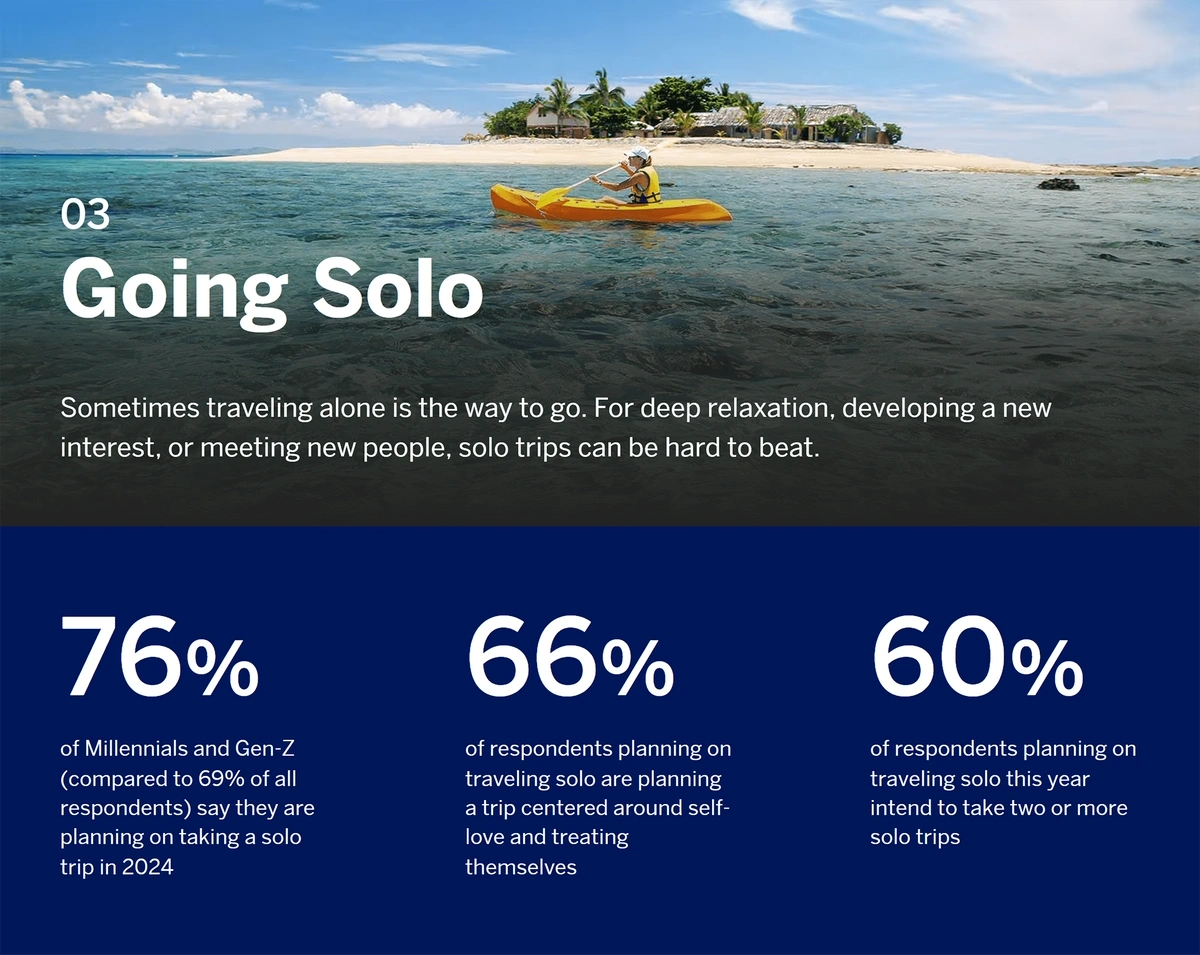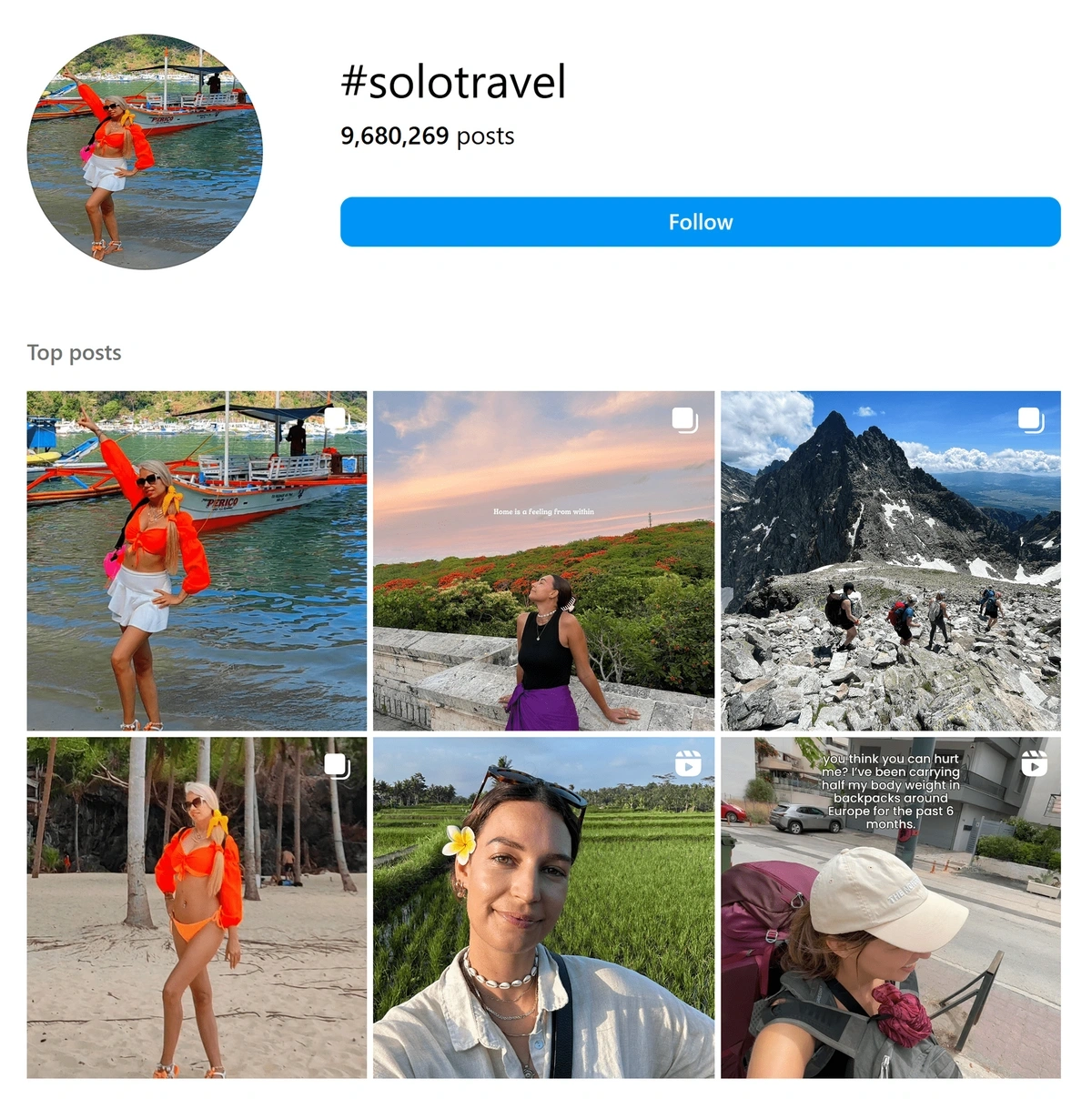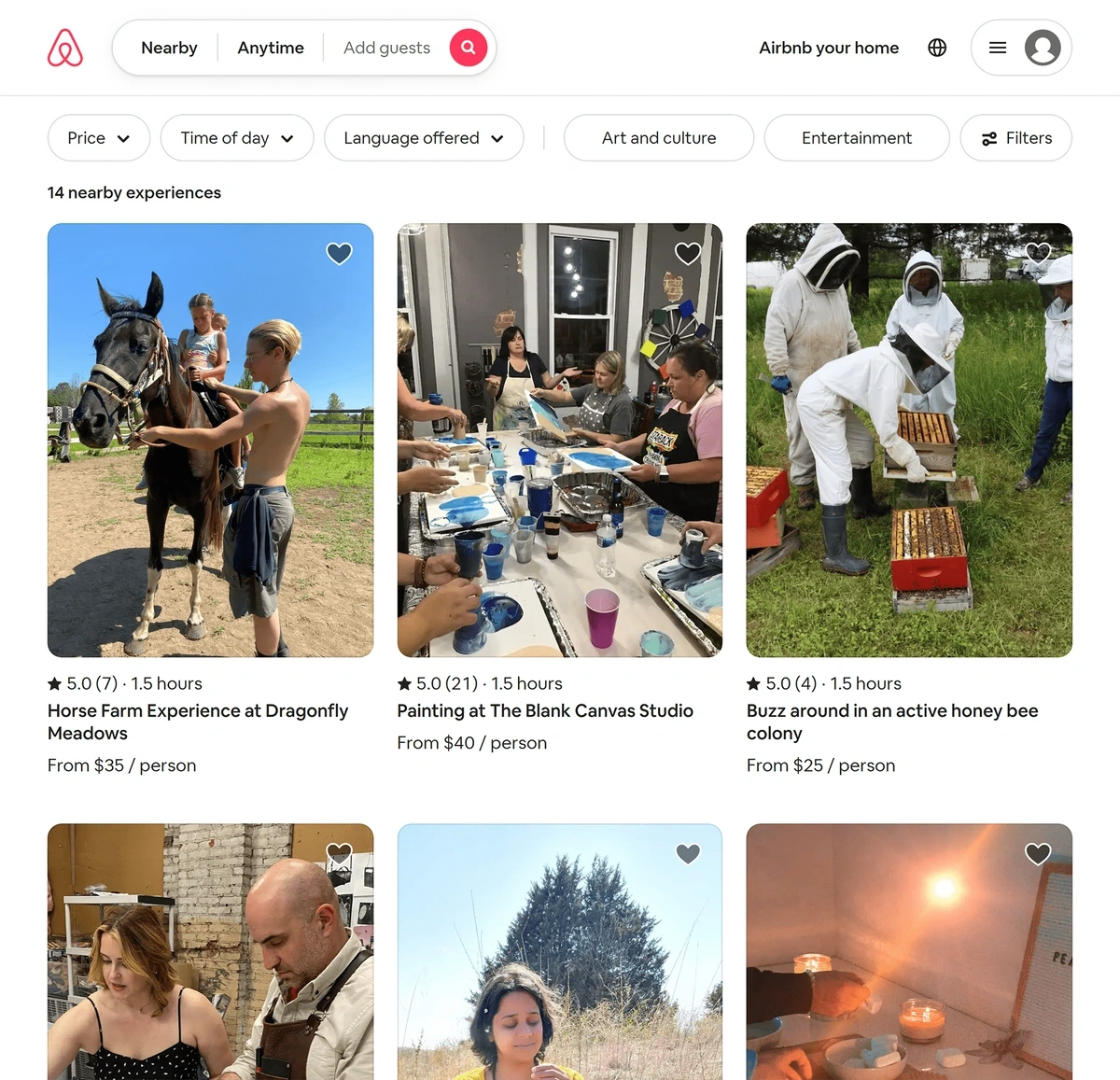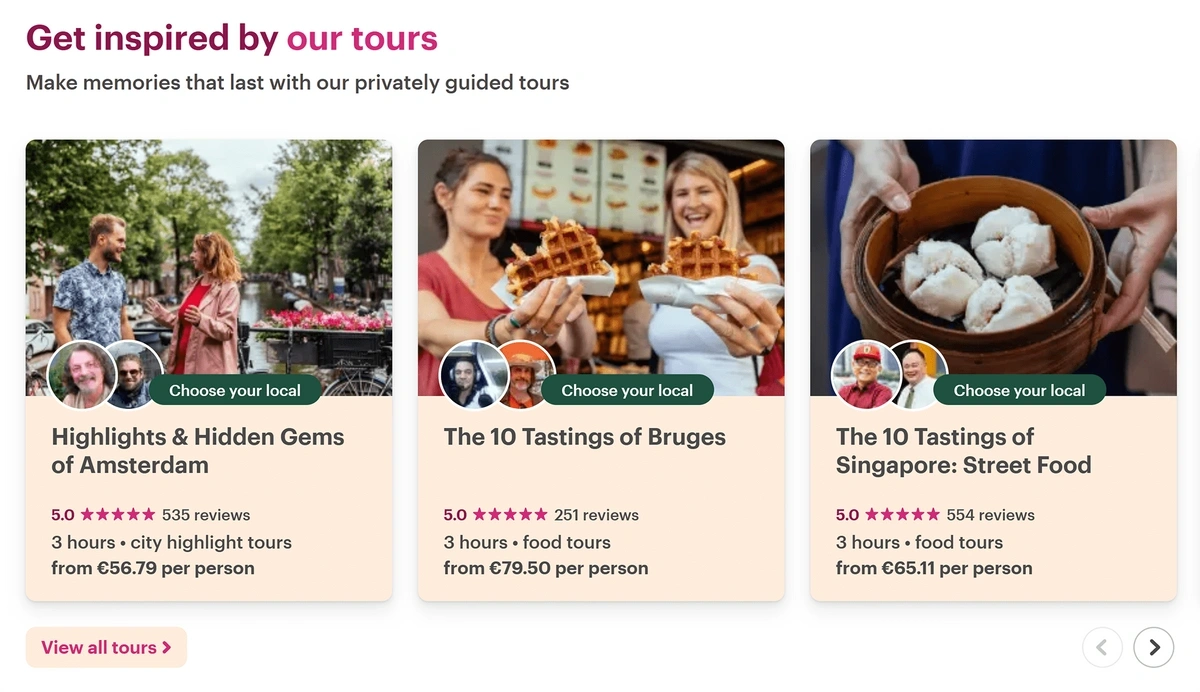10 Ways That You Can Travel Around Abroad For (Almost) Free
8 min readYou may also like:
This is our list of the top 7 travel trends happening right now (in 2024).
Along with expert predictions about trends that are likely to blow up in 2025.
1. Travelers go it alone
A survey by American Express found that 69% of travelers are planning a solo trip this year.

A majority of travelers are interested in traveling alone.
Notably, younger generations are more open to traveling on their own.
The same survey discovered that 76% of Gen Z and Millennials were open to solo travel.
There are other signs that this trend is on the rise.
Google searches for “solo travel” have increased by 223% over the last 10 years.

Google searches for “solo travel” over time.
Solo travelers are big on social media too. We’re seeing a large increase in videos and images posted on social media that feature solo adventures.

The #solotravel hashtag has been used on Instagram over 9 million times.
The big question is: why are more people planning trips alone?
- Self-care: AMEX’s recent Global Travel Trends Report found that 66% travelers planning to go solo did so to focus on treating themselves.
- Less hassle: No need to coordinate agendas or competing interests. Solo travelers can book the exact trip they desire without compromise.
- Quick refresh: Most solo trips are for smaller getaways. Which makes them ideal for a weekend or single-week trip. Travelers still prefer a partner for longer journeys.
- Meeting new people: Traveling alone makes it more likely to make new connections with locals or with other travelers.
2. Travelers crave local experiences
The “experience economy” is huge in the travel industry.
However, fewer travelers are seeking traditional sightseeing expeditions.
Instead, “consumers [will] pursue authentic experiences, distancing themselves from mainstream tourism providers and venturing into pastimes that feel more meaningful”.
Data insights company AirSage marks this as an emerging trend because “people no longer want boring and conventional travel experiences as much as they used to. Instead, they would rather pay for vacations that are once-in-a-lifetime opportunities”.
Airbnb is betting on this trend.
Their Experiences feature makes it easy for people to have unique experiences on their trip “hosted by locals”.

Examples of Experiences offered by Airbnb.
Airbnb currently offers around 50,000 experiences.
The company also recently launched “Icons“, which is essentially a VIP version of Experiences.
For example, travelers can book a night to hang out with comedian Kevin Hart.

One example of an Airbnb “Icon” experience currently offered.
Other companies are banking their entire business model on this trend.
Withlocals offers “personalized traveling” — the opportunity for travelers to book private tours and activities with locals around the world.

Shot of tours and experiences on Withlocals.
Camping (and glamping) trips have also become a popular way for people to travel while experiencing the local culture.
Companies riding this trend include:
Outdoorsy has been called the “Airbnb of RV rentals”.
Under Canvas runs seven glamping camps in wilderness locations across the United States aimed at exploring the local landscape and inspiring human connections.
3. Travel tech adoption accelerates
Technology is presenting the travel industry with seemingly endless opportunities.
The pandemic served to increase the speed of tech adoption in the travel industry.
A McKinsey survey showed that “companies have accelerated the digitization of their customer and supply-chain interactions and of their internal operations by three to four years”.
One example: room service robots.
Two Chinese hotel giants invested in ExcelLand, a manufacturer that already had 3,000 robots in operation.

Hotel robots are already being used in a small number of hotels.
BTG Homeinnes is looking at these robots as a way to control costs and safeguard guests.
Hotels, airlines, booking sites, and others are using chatbots like never before.
Travelers can chat with providers during every stage of their journey.
And, they won’t (always) feel like they’re talking to a robot. Advances in generative AI have made this type of communication hassle-free.

Searches for “chatbot” have increased significantly since ChatGPT’s launch in late 2022.s.
United Airlines has launched an “Agent on Demand” service that allows travelers at the airport to video chat with a customer service representative simply by scanning a QR code.
More and more airlines and airports are deploying facial recognition technology.
Corporations and government entities tout this technology as a boon for travel safety.
But many privacy advocates have put a halt to this emerging trend. They warn that this type of surveillance could easily turn dystopian.
With all of this new tech, companies are also continuing to capitalize on an older piece of technology — the smartphone.
Stats show that travelers who book tours and activities on their phone spend 50% more than those who book elsewhere.
4. Consumers blend business and leisure travel
The latest statistics say there are nearly 17 million digital nomads in America.
The concept of being location-independent, traveling and working remotely, has become even more popular since the start of the pandemic.
The hospitality industry is starting to cater specifically to digital nomads.
Aruba is opening its beaches up to travelers who’d like to work remotely, calling the marketing campaign “One Happy Workation”.

Aruba is looking to attract the growing digital nomad community.
Visitors can stay for up to 90 days. And do not need any governmental documentation.
Barbados and the Cayman Islands will also let you work remotely from paradise for an extended period of time.
Booking.com reports that the “workation” trend is going strong.
More than 50% of travelers say they would extend their business trip to enjoy personal time at their destination.

Search growth for “workcation” fluctuates quite a bit. But is consistently growing (1,500% in the last 5 years).
Hotels are beginning to even cater to locals who needed a quiet place to work.
The Hamilton Hotel in Washington, DC, is just one example. It’s WFH-Work From Hamilton program offers rooms on a 6:00 am to 7:00 pm schedule.
5. The travel industry gets serious about sustainability
Recent data shows that more than half of US travelers believe there aren’t enough options when it comes to sustainable travel.

Searches for “sustainable travel” are up 92% over the last 5 years.
A poll conducted on behalf of Exodus Travels went even deeper into consumers’ attitudes.
It showed:
- 91% of travelers see the importance of taking ethical trips
- 56% believe in buying souvenirs from local merchants
- 44% want to support local businesses at their destination
Sustainable travel involves minimizing impact on the local cultural environment.
And also taking an eco-friendly approach to the physical environment.
Nearly 70% of travelers say they are more likely to book accommodations if they know the property is planet-friendly.
Many in the travel industry have recently made commitments to preserving the environment.
For example, India-based ITC Hotels Group has LEED certified each of its hotels.
As of 2023, hotels in the state of California will no longer be allowed to provide single-use toiletries in plastic bottles to their guests.

Removing single-use plastic from hotel rooms is one relatively simple way that hotels are minimizing their environmental impact.
Marriott International has made a pledge to remove these types of plastics from all their hotels, too. But the pandemic has put a temporary stop to that plan.
A recent report from Skift made this summary statement regarding sustainable travel in the future:
“[It’s a] less flashy way of viewing and traveling the world . . . with an emphasis on safety, sustainability, and profound experiences while getting from point A to B without wrecking the climate and local quality of life in the process”.
Sustainability isn’t just about helping the environment.
Offering sustainable travel options has the potential to increase revenue as well.
A survey by Simon Kucher found that high net worth consumers are willing to pay up to 40% more for a travel option focused on sustainability.
Booking.com surveyed travelers and found that they’d be happy to pay a premium for accommodations that were certified sustainable.
The exact figure of how much consumers are willing to pay for sustainability varies from study to study.
But overall, we see that most travelers are happy to pay around 10-20% extra for vacations that have sustainability in mind.
6. Younger Travelers Seek Exotic Destinations
McKinsey recently discovered a generational divide among travel preferences.
Specifically, they found that Gen Z and Millenials were just as likely to book an international trip than a domestic one.
Members of Boomers and Generation X were 2x more likely to travel domestically.

A survey of 5,000 travelers found an interesting different in how younger and older folks prefer to travel.
Notably, older generations have different goals when it comes to travel.
Younger generations are primarily looking for fun, novel experiences.
While older folks are aiming to spend quality time with family.
In fact, older travelers specifically cite that having fun with loved ones is a bigger priority than seeing a new place.
Here are a few other reasons that younger generations are seeking destinations abroad more often:
- Lower barrier to entry (literally): More and more countries are offering visa on arrival or other programs to encourage international visitors. Older generations likely remember the hassle of needing to arrange visa and other travel arrangements well before booking a trip.
- Staying in touch: Smart phones and communication apps makes it easy for travelers to keep in touch with friends and family at home.
- Easy navigation: Travelers can use apps like Google Translate and Apple Maps to get around their destinations without hassle.
- Bragging rights: Showing off a video or picture from an exotic place is likely to get more engagement on social media compared to posts featuring local destinations.
7. AI Adoption Increases
Generative AI platforms (ChatGPT, Perplexity etc.) could see real world impacts on the travel industry in the very near future.
In fact, Skift recently asked 17 executives from the travel industry about their outlook on AI.
These executives largely saw tremendous promise in adopting AI and machine learning technology to their businesses.
Specifically, these executives saw a few areas that AI could be used to improve operations in the travel space:
- Personalization: Generative AI tools can be used to help plan personalized itineraries for guests. For example, a travel agent could prompt ChatGPT with: “My client is a 40 year old single mother with a 10-year old son. They want to travel somewhere abroad that has plenty of gluten free eating options”. And the AI could provide a list of suggestions for that specific traveler.
- Advanced segmentation: AI has the potential to offer hyper specific targeting options. Some even think that AI could even generate campaigns for a specific customer.
- Customer service: Incorporating AI tools into workflows can help improve the customer experience for both the traveler and staff members. For example, AI can automatically answer common questions that come in. Which empowers workers to spend more time on challenging situations or edge cases.
Other uses cases for AI in travel include:
- Predictions: AI can analyze large amounts of data to help predict future demand at specific destinations.
- Booking agents: The process of booking a trip may change from manually buying airline tickets and hotel rooms online. Instead, AI agents may take care of all of the details on the traveler’s behalf.
- Real-time translation: LLMs like ChatGPT-4o are capable of essentially real-time translation via audio.
Conclusion
That’s it for the top seven trends driving the travel and tourism industry forward into 2024 and beyond.
Through these trends, we can see a dynamic relationship between the travel industry and consumers.
It’s a push-and-pull that’s sure to continue in 2025 and companies that can adapt quickly to the changing wants and needs of travelers are the best suited for future success.



